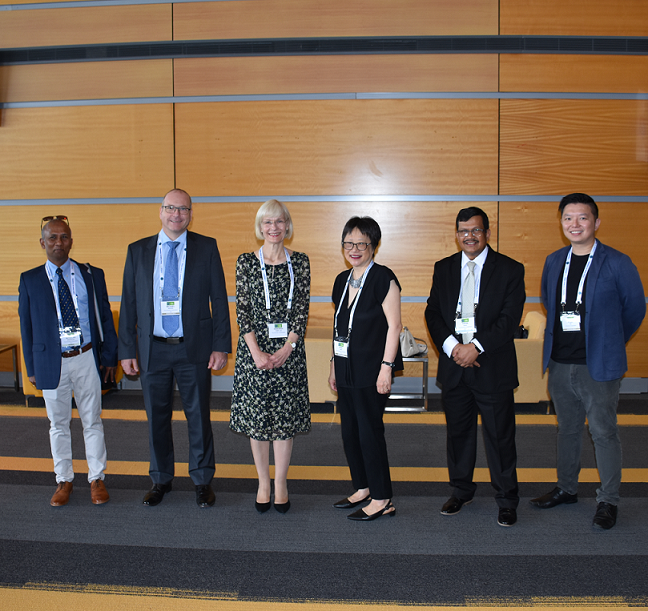The School of Information Technology and Electrical Engineering was proud to be a Platinum sponsor of the recently concluded 10th IEEE PES Innovative Smart Grid Technologies Conference – Asia, a conference involving stakeholders of the electricity industry. The hybrid conference ran between 5th to 8th of December 2021 with 4 parallel sessions for three days and over 200 topics presented. A Women in Engineering, Student and Early Career networking event was also included as part of the conference program offering.
Close to 300 conference delegates participated from over 40 countries around the world; lead by Australia and followed by delegates tuning in from Japan, USA and China. Delegates of the conference comprised of those working in industry, academia and research and development organisations, regulators, market operators, government organisations and the electricity sector utilities.
Professor Tapan Saha, Leader of the School’s Power, Energy and Control Engineering discipline played a crucial role in bringing the conference logistics together in his role as Chair of the event.
The conference highlighted and addressed the challenges and various opportunities in the field of renewable energy; and the need for future grid transformation in order to provide a sustainable and resilient pathway in order to better manage the impacts of climate change.
Highlights of the conference included the official Conference Welcome by UQ’s Vice-Chancellor and President, Professor Deborah Terry AO who thanked fellow Brisbane-based universities QUT and Griffith University for also supporting the event.
In her welcome address, Professor Terry commented on the proximity of the scheduling of this conference with the 26th UN Climate Change Conference (COP-26), which was staged in Glasgow, in early November.

Left to right: Professor Mithulan Nadarajah, Professor Michael Brünig, Professor Deborah Terry AO, Professor Vicki Chen, Professor Tapan Saha and Professor Ryan Ko
“It will take some time to unravel all of the implications of COP-26 and to gain clarity on what they mean for economies, industry sectors, communities and the everyday lives of individuals,” Professor Terry said.
“But, important as that process is, we should resist having our attention completely monopolised by the colour and movement of a mega-conference like COP-26. For the very good reason that there are organisations, communities and individuals everywhere who have been simply ‘getting on with the job’ of contributing to a low-carbon future.”
As an example of this, Professor Terry highlighted UQ’s commitment to being a leader in renewable energy, as demonstrated by the development of it its own 64-megawatt solar farm, located at Warwick, about 160 kilometres south-west of Brisbane.
Another example of this commitment is UQ’s partnership with fellow conference Platinum-level sponsor, GridQube Pty Ltd. Alongside a number of other commercial and industry partners, UQ and GridQube are trialling a software platform that aggregates data from a range of sources to help distribution network service providers manage distributed energy resources in low voltage networks. In turn, this allows networks to assess how much consumer-owned renewable energy can safely be connected to the electricity grid without additional investment in infrastructure.
Other key highlights of the conference included the keynotes from Dr Arshad Mansoor, President & CEO of EPRI, Dr Imre Gyuk from the U.S. Department of Energy, Peter Price from Energy Queensland and also, the Leadership Forum which included representatives Professor Paul Simshauser from Powerlink, Dr Alex Wonhas from AEMO and Mr John Cole from Edify Energy.
In conclusion, delegates were able to walk away from the conference equipped with an abundance of exchanged ideas from the various knowledge-sharing sessions. Stakeholders have already embarked on a transformation journey in the sector.
Customer empowerment and disruptive technologies are already driving paradigm shifts; with a strong demand for solid business continuity plans involving innovative solutions, increasing energy storage capacities, accelerating carbon reduction and relying on electrification and low carbon fuels as the way forward into the next decade.
For media enquiries, please contact Laura Jiew via l.jiew@uq.edu.au



